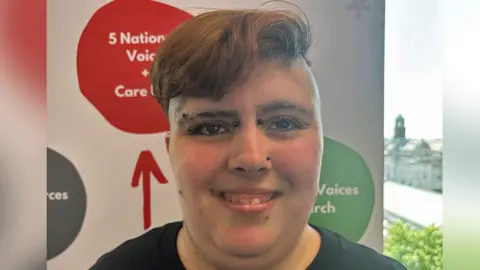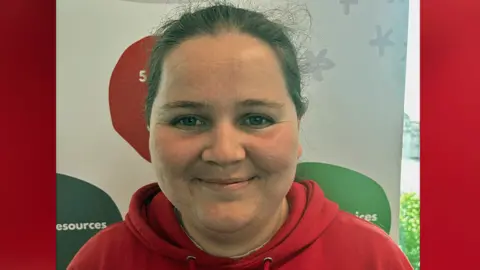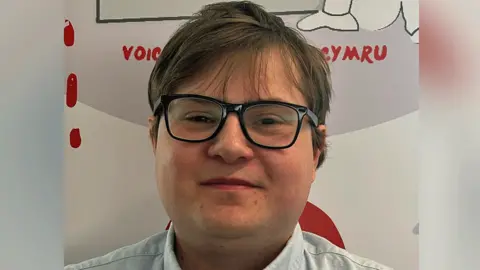'I had a psychotic episode before I was taken seriously'
 Georgia
GeorgiaA woman who was moved into care as a teenager has said she "had to reach a psychotic episode" before anyone took her mental health seriously.
Georgia, who was moved around between foster and children's homes, said her mental health was "already terrible", including self harm, before going into care aged 14.
Campaigners and politicians said children in care, or with care experience, should get priority access to mental health services with research saying they were four times more likely to face mental health difficulties compared to other peers.
The Welsh government said it has published a new 10-year mental health and wellbeing strategy to ensure that everyone can access the right support.
Georgia said: "It got to the point where I basically had to have a psychotic episode before anyone could go 'oh, you are actually serious when you say your mental health is going downhill'.
"The self-harming got worse, more regular.
"I feel like in the care system you have to do quite a lot to get any sort of attention."
Joanne, 23, was moved to many foster homes and said she never had stability growing up.
"I didn't have the support network I needed when I was at my most vulnerable point," she said.
"I've suffered with mental health since I was really young but it was never realised.
"A lot of foster placements would tell me it was just for attention and that anxiety and depression wasn't such a thing."
 Joanne
JoanneResearch for Healthcare Inspectorate Wales' Report on Children's Mental Health Support shows that those in care were four times more likely to experience mental health difficulties.
This has prompted calls for statutory measures to be introduced, according to Helen Mary Jones, of Carers Trust Cymru.
"If you've got rights and they can't be enforced, they're meaningless," she said.
A legislative proposal by a cross-party group of politicians aims to protect and strengthen the rights of young people across Wales, with focus on those currently in care or who have experienced the care system.
Jane Dodds, leader of the Welsh Liberal Democrats, said: "Given the trauma that they've had, the background that they've had, they should really be at the front of the queue for ongoing consistent mental support.
"We want [support] up until the age of 30 so it doesn't stop when they're 21 or 25, that's really arbitrary, we know that their needs extend way into their adulthood."
 James
JamesJames, who was placed in foster care at two months old, has said he finds it difficult to sustain relationships with his time in care having a lasting effect in adulthood.
"When I was adopted there wasn't any mental health support for me or my parents," he said.
"It was really, 'you are adopted, that's it, off you go' and that affected me greatly growing up.
"With being adopted and separated from my birth parents, that has an effect on attachment."
Brendon, who spent six years in care and works in the young care sector, said he continues to struggle with his mental health in his mid-20s.
"It definitely traumatised me, I'm not going to lie about that," he said.
"It's taken me a while to understand the trauma that's had on me, and the effects that it's had on my mental health even up until now.
"I think it has been incredibly difficult in terms of understanding boundaries, emotions."
The Welsh government said more than 400 young people were engaged in the consultation on its 10-year mental health and wellbeing strategy which "focuses on prevention and implementing a stepped care model".
It said the strategy would "ensure people can access the most appropriate form of support at the right time, without delay".
- More on this story on BBC Politics Wales
- Use BBC Action Line for help and support regarding mental health
